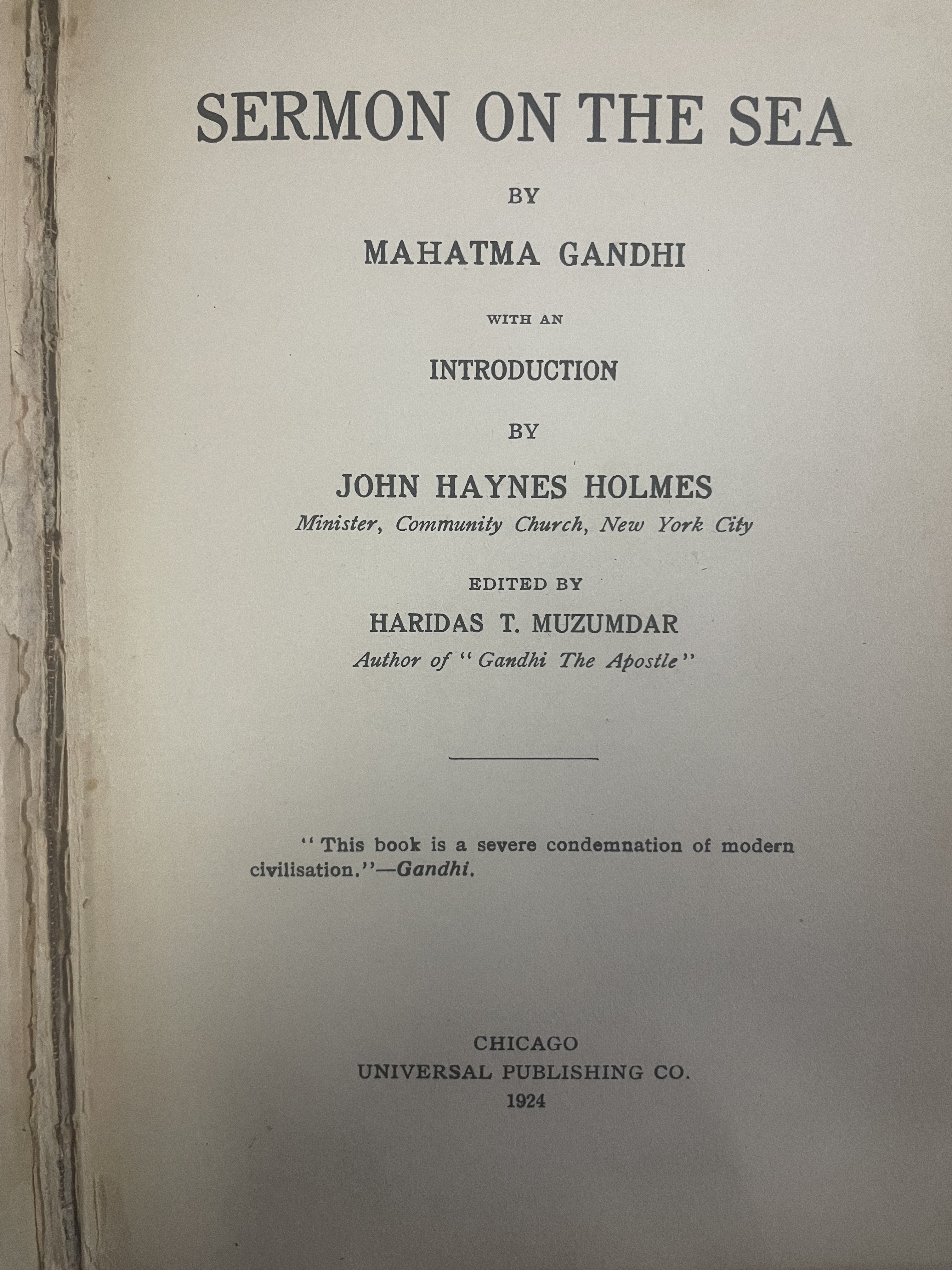Sermon on the Sea

About
Summary
Exquisite
TOC
Details
Related
URL
Images
Overview
Sermon on the Sea by Mahatma Gandhi is a compilation of reflections from his voyage to South Africa in 1914. Edited by Haridas T. Muzumdar with an introduction by John Haynes Holmes, this work marks a turning point in Gandhi's philosophy, distilling his beliefs on politics, governance, and ethics.Sermon on the Sea captures Mahatma Gandhi's thoughts and spiritual leanings during a transformative sea voyage.
Importance of Book
Insights into Gandhi's Philosophy: The book offers a glimpse into Gandhi's inner thoughts and spiritual leanings, providing valuable insights into the development of his philosophy.
Understanding Gandhi's Vision for India: It sheds light on Gandhi's vision for a free and just India, based on the principles of nonviolence, self-reliance, and social justice.
Guidance for Personal Transformation: The book offers guidance for individuals seeking to transform themselves and live a more meaningful and purposeful life.
Relevance to Contemporary Issues: The themes explored in Sermon on the Sea, such as social justice, nonviolence, and sustainable living, remain highly relevant in today's world.
Documenting Gandhi's Journey: The book documents Gandhi's personal and philosophical journey, providing context for understanding his later actions and decisions.
Connecting Spirituality and Action: Sermon on the Sea represents Gandhi's effort to bring the worthiness and connect spirituality and action. Gandhi showed that the true and lasting path to change involved both inner transformation and outward action in the service of humanity.
Key Themes
Nonviolence (Ahimsa): The power of nonviolent resistance as a means of achieving social and political change.
Truth (Satya): The importance of truthfulness and honesty in all aspects of life.
Self-Discipline (Brahmacharya): The need for self-control and discipline in order to achieve spiritual growth.
Social Justice: The pursuit of equality, fairness, and justice for all members of society.
Swaraj (Self-Rule): The importance of self-reliance and self-governance at both the individual and national levels.
Sarvodaya (Welfare of All): The commitment to the well-being of all, especially the most vulnerable.
Simple Living: The value of minimizing material possessions and focusing on spiritual growth.
Love and Compassion: The transformative power of love and empathy in human relationships.
Relevance of the Sermon on the Mount: Gandhi revered the Bible as a sacred book, because of the Sermon on the Mount.
Cultural Significance
Reflection of Indian Philosophy: The book reflects the values, beliefs, and traditions of Indian philosophy, particularly its emphasis on spirituality, nonviolence, and social harmony.
Inspiration for Social Activism: It has inspired social activists and reformers around the world to adopt Gandhi's methods of nonviolent resistance.
Promotion of Interfaith Dialogue: Gandhi's respect for all religions and his ability to find common ground between different faiths promotes interfaith dialogue and understanding.
Ethical Guidance: As a compilation of Gandhi's thoughts, the book offers ethical guidance for individuals and societies seeking to create a more just and peaceful world.
Influence on Martin Luther King, Jr.: Martin Luther King, Jr. preached about the significance of Gandhi's 1928 salt march. King stated that Gandhi caught the spirit of Jesus Christ, and lived it more than anybody else in the modern world.
Effects on Society
Influence on the Indian Independence Movement: Gandhi's philosophy of nonviolent resistance played a crucial role in India's struggle for independence.
Inspiration for Social Reform Movements: His teachings have inspired numerous social reform movements aimed at addressing issues such as poverty, inequality, and discrimination.
Promotion of Peace and Nonviolence: The book has helped to promote the values of peace, nonviolence, and tolerance in a world often plagued by conflict and division.
Ethical Framework for Governance: Gandhi's ideas have influenced the development of ethical frameworks for governance and public policy, both in India and abroad.
Legacy of Mahatma Gandhi: Ultimately, it adds to the legacy of Mahatma Gandhi, a towering figure in modern history who continues to inspire people with his message of love, peace, and social justice.
Title
Sermon on the Sea
Author
Mohandas Gandhi
Name of Publisher
Universal Publications
Publish Date
1924
Subject
A collection of Gandhi\'s reflections and thoughts
Vintage
1901-1947
Edition
First
Category
Gandhi
Sub Category
Biography
Rarity
RARE
